System Change Not Climate Change
• DC Demonstrators Demand: Protect Environment and Our Rights! No Keystone XL Pipeline
•
Stop Big Oil and Keystone Pipeline • Canadians and First Nations Say, Our Oil, We Decide!
Demonstrators Demand: Protect Environment and Our Rights! No Keystone XL Pipeline
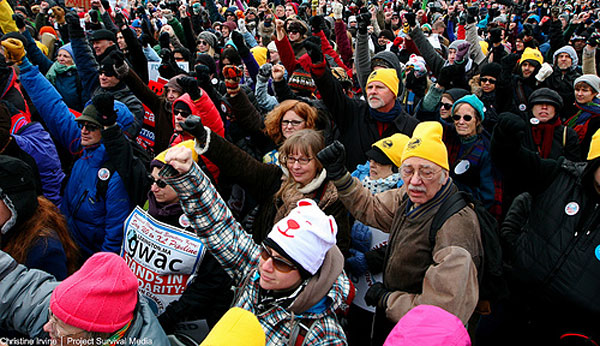
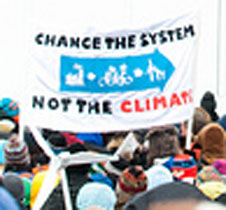
![]()
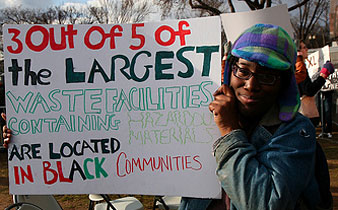
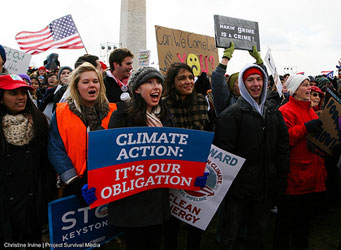
![]()
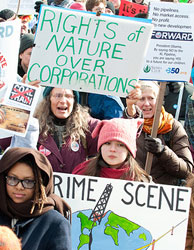
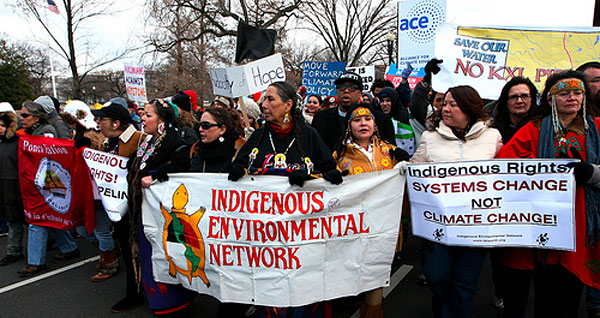
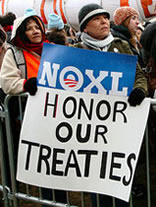
![]()
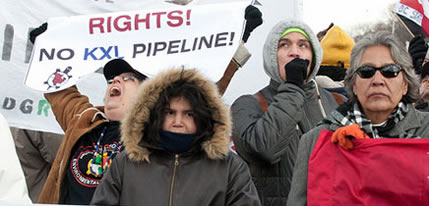
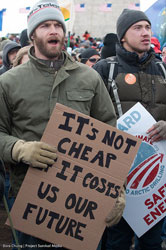
![]()
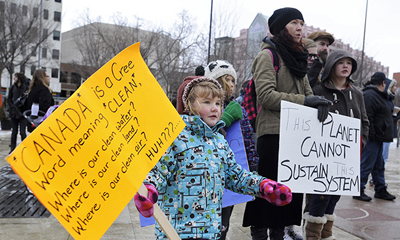
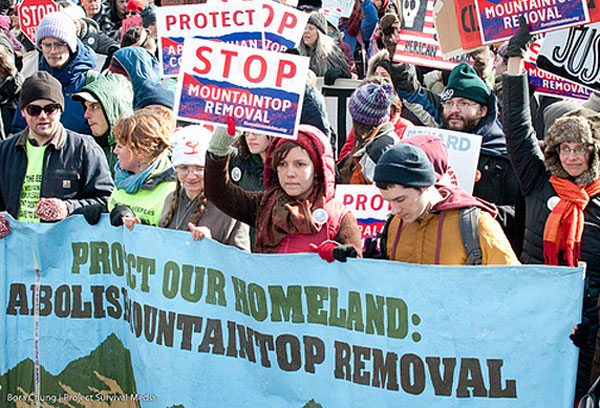

![]()
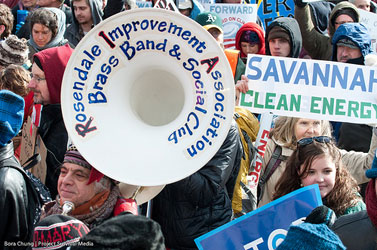
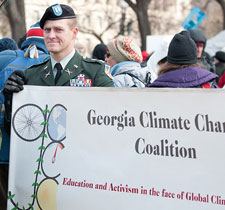
![]()
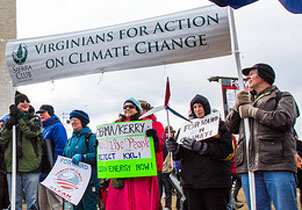
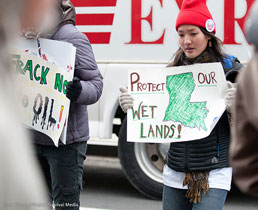
![]()

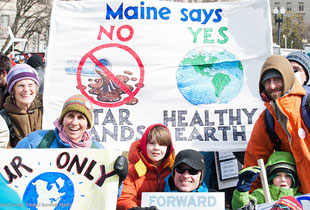
![]()
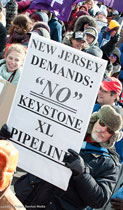
![]()
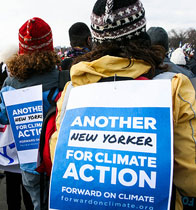
![]()
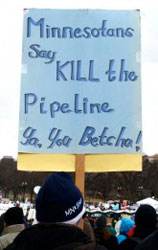
![]()
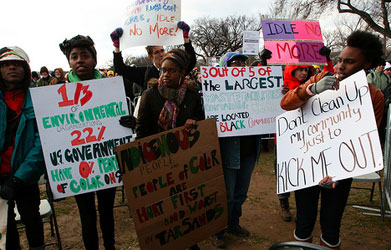
![]()
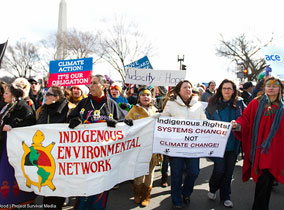
![]()
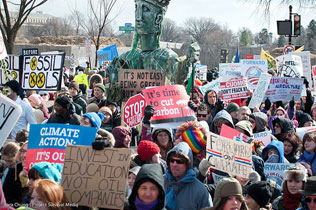
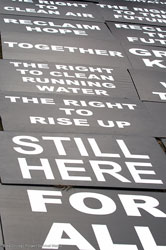
![]()
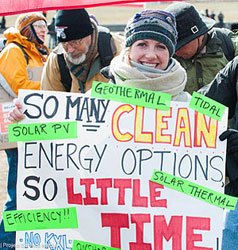
![]()

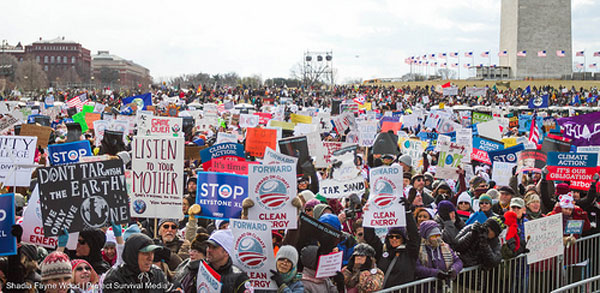
On February 17 more than 40,000 people from across the country demonstrated in Washington, DC, demanding that Obama take action to protect the environment and rights of the peoples. Indigenous peoples, including many from Canada, farmers, energy workers, environmental activists, students, scientists, and many others stood together to demand that the serious problems of climate change be taken up. As one of the signs put it: System Change not Climate Change! Participants recognized that the existing system where monopoly right dictates and the rights and demands of the public are denied must change to protect the human and natural environment. They called on Obama to have his deeds match his words: “For the sake of our children and our future, we must do more to combat climate change,” (Obama State of the Union). And they used the action to strengthen their continuing work together.
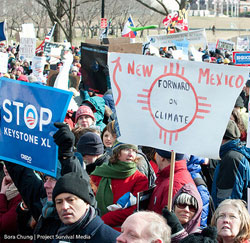 In one of the largest demonstrations in recent times, more than 160 organizations brought together groups and activists from all regions of the country. They were welcomed by the Piscataway Indian Nation, whose lands include Washington, DC. Several organizations, 350.org, Protesters represented the broad concern about climate change and its related disasters, like Superstorm Sandy, record droughts, and rising sea levels. Attention was focused on the proposed Keystone XL Pipeline (running from Alberta Canada to Gulf Coast refineries in Texas) that serves the private interests of the oil and military monopolies while posing grave dangers to the human and natural environment.
In one of the largest demonstrations in recent times, more than 160 organizations brought together groups and activists from all regions of the country. They were welcomed by the Piscataway Indian Nation, whose lands include Washington, DC. Several organizations, 350.org, Protesters represented the broad concern about climate change and its related disasters, like Superstorm Sandy, record droughts, and rising sea levels. Attention was focused on the proposed Keystone XL Pipeline (running from Alberta Canada to Gulf Coast refineries in Texas) that serves the private interests of the oil and military monopolies while posing grave dangers to the human and natural environment.
Obama has to give presidential approval to the pipeline as it runs across the border. Last year he postponed that decision, awaiting a State Department environmental impact statement. On March 1, the State Department, backing the energy and military monopolies, issued their statement saying the pipeline would not negatively impact the environment. The conclusion flies in the face of studies, documentation and direct experience with a spill in Michigan from an existing tar sands pipeline. Despite a two-year clean-up effort and nearly a billion dollars in costs, officials at the Environmental Protection Agency (EPA) have found that nearly 40 miles of the Kalamazoo River is still contaminated by submerged tar sands. Tar sands production produces two to three times the carbon emissions that regular oil production, with both causing serious harm to the environment.
Keystone is a joint project of U.S. oil monopoly ConocoPhillips, the second largest refiner and third largest integrated energy monopoly in the U.S. and Canadian monopoly TransCanada. The pipeline is designed to ensure U.S. control of Canadian oil resources and serves the private monopoly interests, including the war economy and all the human and environmental destruction it imposes.
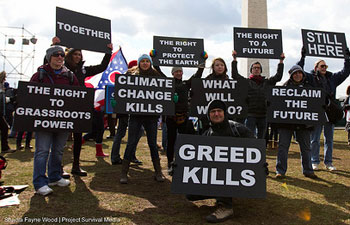 As the demonstration reflected, there is broad opposition in both the U.S. and Canada to the pipeline. Indigenous peoples and the public more broadly have the firm stand to block its construction. ConocoPhillips and TransCanada have attempted to get around opposition by proposing to the federal government only a partial plan for the pipeline, from Alberta, through Montana and South Dakota to Nebraska. They are hoping this more limited proposal will secure Obama’s support, which appears likely given the State Department environmental statement. The monopolies have also proceeded with building the southern section in Texas and Oklahoma, as these require only state permits.
As the demonstration reflected, there is broad opposition in both the U.S. and Canada to the pipeline. Indigenous peoples and the public more broadly have the firm stand to block its construction. ConocoPhillips and TransCanada have attempted to get around opposition by proposing to the federal government only a partial plan for the pipeline, from Alberta, through Montana and South Dakota to Nebraska. They are hoping this more limited proposal will secure Obama’s support, which appears likely given the State Department environmental statement. The monopolies have also proceeded with building the southern section in Texas and Oklahoma, as these require only state permits.
The spirit at the demonstration is that this entire direction demanded by the monopolies is unsustainable and a danger to humanity and Mother Earth. Their signs emphasized that governments are accountable to defending the rights of the people and protecting the environment and that their refusal to do so means, Change the System, Not the Climate!
[TOP]
Stop Big Oil and Keystone Pipeline
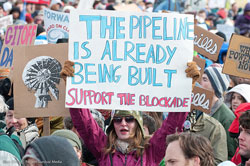 Big Oil has embraced the dirty and dangerous Keystone XL tar sands pipeline as its cause célèbre. This isn’t surprising given the billions in oil profits at stake, but it is important to get to the truth behind their claims. Very simply, the pipeline is a scam.
Big Oil has embraced the dirty and dangerous Keystone XL tar sands pipeline as its cause célèbre. This isn’t surprising given the billions in oil profits at stake, but it is important to get to the truth behind their claims. Very simply, the pipeline is a scam.
Oil Profits and Oil Influence
With billions in profits at stake, the oil industry is pulling out all the stops to get Keystone XL built. TransCanada alone spent $1.3 million in lobbying in 2011, and pro-pipeline members of the House of Representatives took $12 million from the oil industry in 2010–2011. Millions more have gone to pro-pipeline special interest groups like the American Petroleum Institute and the U.S. Chamber of Commerce, as well as other lobbyists and political operatives, to make Keystone XL their #1 priority.
Exports and Energy Insecurity
Tar sands oil is largely destined for export. Retired Brigadier General Steven Anderson said it plainly: “The Keystone XL pipeline will not reduce America’s dependence on Middle East oil, or do anything to get us off oil completely, which is key to America’s national security future.” An increase in fuel economy of just 2.5 mpg would completely eliminate the need for all the oil carried by this pipeline.
Dirtiest Oil on Earth
Tar sands crude contains massive amounts of heavy metals and cancer-causing toxins and must be pumped at extreme temperature and pressure. TransCanada’s Keystone 1 pipeline had 12 spills in its first 12 months of operation. Spills on Keystone XL would pollute waterways, destroy farmland, and put drinking water at risk along the entire 1,700-mile route.
Drawing the Line at Tar Sands
We challenge the idea that the oil industry is entitled to throw open this massive source of carbon pollution. We are fighting to prevent the worst-case scenario and to avoid the worst consequences of climate disruption. Stopping Keystone XL and the exploitation of the Alberta tar sands is a major priority.
[TOP]
Canadians and First Nations Say,
Our Oil, We Decide!
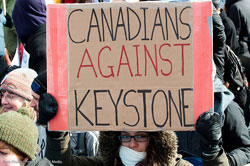 How the energy resources that belong to Albertans, First Nations and Canadians should be exploited and distributed is a key issue. The Workers' Opposition is demanding that governments fulfill their social responsibility to ensure that there is broad benefit to Canadians when our natural resources are exploited, not just a fast buck for the mainly foreign owners of capital and their retinue in Alberta and Canada. Not only must the oil workers who produce the wealth and the building trades workers who construct these massive projects be provided with living and working conditions that respect their rights and dignity, but the natural environment and the hereditary rights of the First Nations must be given priority. The basis is that society must be human-centered, not capital-centered and this can be done if decision-making is carried out for purposes of providing human rights with a guarantee, not the most powerful private monopoly interests which negate all other rights which stand in their way.
How the energy resources that belong to Albertans, First Nations and Canadians should be exploited and distributed is a key issue. The Workers' Opposition is demanding that governments fulfill their social responsibility to ensure that there is broad benefit to Canadians when our natural resources are exploited, not just a fast buck for the mainly foreign owners of capital and their retinue in Alberta and Canada. Not only must the oil workers who produce the wealth and the building trades workers who construct these massive projects be provided with living and working conditions that respect their rights and dignity, but the natural environment and the hereditary rights of the First Nations must be given priority. The basis is that society must be human-centered, not capital-centered and this can be done if decision-making is carried out for purposes of providing human rights with a guarantee, not the most powerful private monopoly interests which negate all other rights which stand in their way.
Who decides how energy resources should be exploited and for whom they should be exploited is a central issue in Alberta. The wealth produced by the workers in the oil and gas sector and construction workers building these massive projects belongs to the people of Alberta and first and foremost the First Nations. How this wealth is produced and distributed is not a special interest. It concerns the polity as a whole. It is a fundamental issue of who determines the public interest and how it is funded. Besides this, oil and gas and construction workers have the right to safe workplaces, wages, benefits and working conditions commensurate with the work they perform. They have a right to modern, cultured living conditions.
When Canadian Prime Minister Stephen Harper and U.S. President Barack Obama met in February of last year, they discussed the forthcoming decision by the U.S. State Department on whether to grant TransCanada Pipelines a presidential permit which would allow construction of the Keystone XL pipeline to go ahead [VOR Ed note: Obama postponed the decision but is again considering allowing the pipeline to go forward, with the State Department issuing a statement March 1, 2013 that doing so would not harm the environment].
The Keystone XL is an expansion to the existing pipeline, which would ship raw bitumen from Canada's tar sands 2,000 miles to the U.S. Gulf Coast. The pipeline is a venture of TransCanada and ConocoPhillips, the second largest refiner and third largest integrated energy monopoly in the U.S.
In response to a question, Harper confirmed that discussion of the pipeline had taken place. He stated that the U.S. would require fossil fuels far in excess of its ability to produce such energy for some time to come. "The choice that the United States faces in all of these matters is whether to increase its capacity, to accept such energy from the most secure, most stable and friendliest location it can possibly get that energy, which is Canada, or from other places that are not as secure, stable or friendly to the interests and values of the United States," Harper said.
In this way Harper emphasized once again that Canada's resources should all be put at the disposal of the U.S., emphasizing that this arrangement favors U.S. "security" of supply, and suggesting that this is also in the best interest of Canadians. The pipeline is promoted as having the potential to eliminate the need to import oil from the Middle East as well as Venezuela.
The Keystone XL will ship up to 1.29 million barrels of raw bitumen a day to the Gulf Coast, sending all the jobs in upgrading, refining and the associated petrochemical industry with it. In a letter to Obama, the American Petroleum Institute stated: "The economic impact of oil sands development in neighboring Canada is expected to lead to the creation of more than 342,000 new U.S. jobs between 2011 and 2015 and add an estimated $34 billion to U.S. gross domestic product in 2015, according to the Canadian Energy Research Institute." Meanwhile, Canada will still have to import oil.
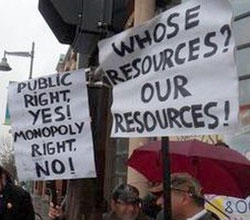 In advance of the summit, both the U.S. and Canadian oil industry called on Harper to push for speedy approval. The fact is that this pipeline has nothing to do with guaranteeing livelihoods for Canadians and their well-being let alone that of the First Nations. It is certainly not a modern nation-building project. It has been broadly opposed in Canada. Oil workers and the union that represents them, the Communications, Energy and Paperworkers Union, and the Alberta Federation of Labor have opposed the pipeline on the basis "Our Oil! We Decide!" The aboriginal peoples downstream of the tar sands and Canadians from all walks of life have demanded that the governments do their duty to protect the environment and act in the interest of First Nations, Canadians and nation-building.
In advance of the summit, both the U.S. and Canadian oil industry called on Harper to push for speedy approval. The fact is that this pipeline has nothing to do with guaranteeing livelihoods for Canadians and their well-being let alone that of the First Nations. It is certainly not a modern nation-building project. It has been broadly opposed in Canada. Oil workers and the union that represents them, the Communications, Energy and Paperworkers Union, and the Alberta Federation of Labor have opposed the pipeline on the basis "Our Oil! We Decide!" The aboriginal peoples downstream of the tar sands and Canadians from all walks of life have demanded that the governments do their duty to protect the environment and act in the interest of First Nations, Canadians and nation-building.
Many environmental groups in both the U.S. and Canada have also opposed the project and expansion of extraction of bitumen from the tar sands that it entails. The Obama administration speaks of its policy of "clean" or "green" energy. In reality, U.S. policy begins with the considerations of secure energy for the U.S. Empire, and the breakneck development of the tar sands has been a direct consequence, with all the negative consequences for Canadians, especially those downstream of the tar sands.
The project has also been driven by the need for places to invest capital. The Obama administration has provided $80 billion "stimulus spending" for energy projects alone to guarantee the profits of the financial oligarchy. Ninety-nine per cent of this funding has been exempted from any environmental review whatsoever. Obama's policy also involves greatly expanding the giant ponzi scheme known as carbon trading, the next big bubble which financial oligarchs like Goldman Sachs have hatched to enrich themselves.
[TOP]
